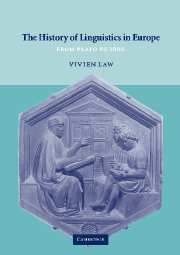Book contents
- Frontmatter
- Dedication
- Contents
- List of illustrations
- List of maps
- List of boxes
- Preface
- 1 Getting ready to study the history of linguistics
- 2 Greek philosophy and the origins of western linguistics
- 3 Towards a discipline of grammar: the transition from philosophy
- 4 From literacy to grammar: describing language structure in the ancient world
- 5 Christianity and language
- 6 The early Middle Ages
- 7 The Carolingian Renaissance
- 8 Scholasticism: linking language and reality
- 9 Medieval vernacular grammars
- 10 The Renaissance: discovery of the outer world
- 11 A brief overview of linguistics since 1600
- 12 Becoming a historian of linguistics
- Research resources in the history of linguistics
- Notes
- Index
8 - Scholasticism: linking language and reality
Published online by Cambridge University Press: 05 March 2015
- Frontmatter
- Dedication
- Contents
- List of illustrations
- List of maps
- List of boxes
- Preface
- 1 Getting ready to study the history of linguistics
- 2 Greek philosophy and the origins of western linguistics
- 3 Towards a discipline of grammar: the transition from philosophy
- 4 From literacy to grammar: describing language structure in the ancient world
- 5 Christianity and language
- 6 The early Middle Ages
- 7 The Carolingian Renaissance
- 8 Scholasticism: linking language and reality
- 9 Medieval vernacular grammars
- 10 The Renaissance: discovery of the outer world
- 11 A brief overview of linguistics since 1600
- 12 Becoming a historian of linguistics
- Research resources in the history of linguistics
- Notes
- Index
Summary
Universities and universals
Up to the eleventh century almost all the scholarly work of the Christians of western Europe had taken place in the great monasteries: Fleury, Corbie, Freising, Reichenau, St Gall, Ramsey and many others. Monasteries were the setting of virtually all intellectual life, except in Italy. But during the central Middle Ages, from the ninth to the eleventh century, partly in response to Charlemagne's edict, schools were being set up in towns, usually closely associated with a cathedral. With the expansion of towns in the eleventh and twelfth centuries the cathedral schools grew in size and significance. If you wanted to get involved in the intellectual issues of the days, you might well study at one of the great cathedral schools of northern France – Reims, Laon, Orléans, Notre-Dame de Paris or Chartres – or perhaps across the Channel at Salisbury or Canterbury. Monastic schools continued to be important centres of learning, but the more open cathedral schools attracted many, while in Italy secular schools teaching law and medicine drew young men with their eye set upon a professional career.
Early in the thirteenth century some of these schools grew into the first universities, notably Paris, celebrated for the Arts, philosophy and theology, and Oxford, also famed for Arts and theology.
- Type
- Chapter
- Information
- The History of Linguistics in EuropeFrom Plato to 1600, pp. 158 - 189Publisher: Cambridge University PressPrint publication year: 2003



